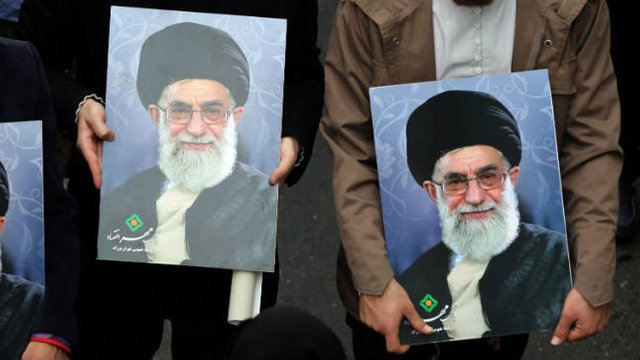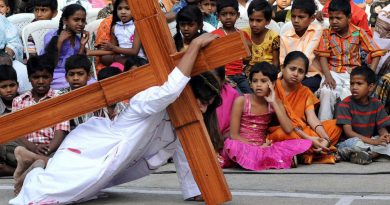No Supreme Leader after Khameini, Power succession will collapse Iran: Analysts
The situation is totally different now in Iran. Khamenei is not Khomeini. It is uncertain that if he names his successor in his will, as Khomeini did, the state’s powerful will pay heed to it or not.
It seems, based on multiple analysts and indications, that Iran is heading for change. The current ultimate ruler of Iran, Grand Ayatollah Ali Khamenei, has been in power since 1989. His health is ailing. The country’s power is shared among its powerful apparatuses, foremost of which is the Islamic Revolutionary Guards Corps (IRGC).
The IRGC, the regime’s powerful military establishment that has precedence even over the army, is said to be prepared for taking over after Khamenei’s demise. Understanding how things will proceed when it comes to succession in Iran requires having a look at the way the process began following the revolution, how Khamenei came to power and how it should proceed based on the regime’s legal and constitutional parameters.
Long past the time for the U.S. to sanction Iran’s IRGC in its entirety as a foreign terrorist organization. Ray Takeyh & I make the case for this here: https://t.co/tRcByaql4r. Also me here: https://t.co/mkmGaFDKzr
— Mark Dubowitz (@mdubowitz) April 5, 2019
Charisma over votes
Ayatollah Khomeini was the first supreme leader in Iran following the victory of the Iranian revolution.
After Shah Mohammed Reza Pahlavi left the country, on 16 January 1979, Khomeini returned in triumph to Iran on 1 February 1979. He was welcomed by throngs estimated, according to the BBC, to be of up to five million supporters.
Then, the power Khomeini derived was from his massive popularity and image as the leader of the uprising. He behaved as the ultimate ruler of the country based on this tacit popular mandate even before writing any official document regulating governance in the country.
Khomeini strongly opposed the provisional government of Shapour Bakhtiar, promising “I shall kick their teeth in. I appoint the government.”
On 11 February, Khomeini appointed his own interim prime minister, Mehdi Bazargan, demanding, “since I have appointed him, he must be obeyed.”
Out of his desire to wipe out his rivals and establish his own version of governance, Khomeini insisted on altering the proposed constitution. For this end, he launched a merciless crackdown on both detractors and allies. Newspapers were closed and parties were dismantled.
The newly proposed constitution included an Islamic jurist Supreme Leader of the country. A Council of Guardians was installed to veto un-Islamic legislation and screen candidates for office, disqualifying those not complying with the core principles of Islam.
In November 1979, the new constitution of the Islamic Republic was adopted by national referendum. Khomeini himself became instituted as the Supreme Leader (the Guardian Jurist). He officially became known as the “Leader of the Revolution.
Khomeini ruled the country from that time until 1989. The handover of power after his death was somewhat smooth. He simply recommended Khamenei as a supreme leader after him. His awe and prestige among the ruling political elite was a decisive factor in facilitating the political process at the time.
Khamenei
Ayatollah Ali Khamenei was elevated to the position of the supreme leader after the demise of Khomeini. Khomeini himself mentioned Khamenei as a preferred successor in his will.
As the people and officials were mourning the blessed body of Imam Khomeini (r.a.) on the 14th of Khordad of 1368, Ayatollah Khamenei – the president of the country at the time – read the political-divine testament of Imam Khomeini (r.a.) in a meeting with the presence of officials and military personalities, Khamenei.ir reports.
Your daily reminder of the brutality of Iran’s Revolutionary Guards https://t.co/GvjAWU84Gt
— Mark Dubowitz (@mdubowitz) April 5, 2019
The website adds: “In the afternoon, the Assembly of Experts held a meeting to choose the Leader or the Leaders of the Islamic Republic. According to Article 107 of the Constitution – which was ratified in the year 1358 – picking the Leader was the responsibility of the Assembly of Experts.”
“Also, another statement by Imam (r.a.) was quoted in the meeting. Imam (r.a.) had pointed out Ayatollah Khamenei’s competence for the Leadership during his trip to China and North Korea. On the basis of these accounts, the election was held and the majority of the members appointed Ayatollah Khamenei as the Leader of the Islamic Republic by considering the late Imam’s (r.a.) opinion and the religious, scholarly and political eligibility of Ayatollah Khamenei.”
Therefore, it is clear that the basis of choosing Khamenei for the top post in Iran as his predecessor’s recommendation. This recommendation, according to commentators, decreased the likelihood of sliding into chaos or disputes among the state’s apparatuses following Khomeini’s demise as well as rivalry among the would-be candidates for the position.
The constitution or leader’s will?
According to the constitution, the Supreme Leader is picked by ‘Assembly of Experts of the Leadership’. It is made up of 88 high ranking mullahs who are ‘chosen’ in a direct election every 8 years. At the same time, the candidates to the assembly need to be endorsed by the ‘Guardian Council’ of the constitution’ which itself comprises 6 top clerics assigned by the current supreme leader, and 6 lawyers recommended by the head of judiciary who is also appointed by the supreme leader.
The Assembly of Experts had convened a meeting to choose the next supreme leader in 1989 after the death of the first Supreme Leader Khomeini. But the decision was taken not by the assembly. The assembly rather endorsed the recommendation of Rafsanjani, who was the commander in chief during the Iraq-Iran war and the most powerful cleric at the time. Rafsanjani was also a member of the experts. At the assembly’s session, he said that he had heard in private from the deceased supreme leader Khomeini that he preferred Khamenei, who was Rafsanjani’s protégé, to be his successor.
According to experts, the only thing that Khamenei had to deserve elevation to the position of the supreme leader was Khomeini’s recommendation, who admired Khamenei’s performance during foreign trips.
There are multiple accounts confirming Khomeini’s opinion in support of Khamenei as the supreme leader. Therefore, the urgent question is: Can this happen again? Or can there be another smooth handover of power in the ironclad theocracy again?
The IRGC
Over the past three decades, the Iranian Revolutionary Guards Corps (IRGC) had his power and clout boosted. It is controlling nearly 90 percent of the county’s economy. It is expected that the apparatus will have a pivotal role in determining who will be Iran’s next supreme leader.
Thus, the IRGC seems to have only one concern: ensuring its political and economic clout it acquired under the current regime.
The IRGC’s pursuit for securing that the coming supreme leader will be more loyalist to it than any other state apparatus, is not a spur of the moment.
In the last Iranian presidential elections in 2017, the IRGC has quietly maintained support for the hardline cleric Ebrahim Raisi, a notorious cleric who had a role in the mass executions carried in 1988 against political prisoners. It even used its street muscles to suppress Rouhani’s supporters. The IRGC arrested a dozen administrators of reformist social media channels on Telegram, a social media platform widely used in Iran.
I made the case back in 2016 in testimony to Senate Foreign Relations Committee that Iran’s IRGC should be designated as a foreign terrorist organization. Long past time for that to occur. https://t.co/vD4reVYXu1
— Mark Dubowitz (@mdubowitz) April 5, 2019
The crackdown comes as part of the IRGC’s role to preserve the Islamic regime. During the 2009 presidential elections, whose official results were disputed by reformists, who said it was rigged in favour of Mahmoud Ahmadinejad, the IRGC led the harsh crackdown on protesters primarily through the Basij, a militia working under the command of the IRGC. Dozens of demonstrators were killed and hundreds were arrested.
The apparatus’s support for Raisi and Ahmadinejad came as their rivals, the incumbent president Hassan Rouhani and the reformist leader Mir-Hossein Mousavi, lambasted the IRGC’s rising economic and political role. The group is in control of massive economic holdings, from construction to oil and mines, worth billions of dollars. Raisi lost the elections to Rouhani. But the IRGC’s clout had not diminished, nor had its keenness to maintain clout seen an interval.
There is another factor that could hinder any smooth power handover in the country. There is no timeframe for choosing the next supreme leader after the demise of the incumbent one. For instance, there is a provision in the constitution of the Sultanate of Oman stipulating that there should be a timeframe determining the period necessary for picking the coming leader of the country. Iran’s Assembly of Experts is legally incapable of doing the same.
Other analysts argue that choosing the coming supreme leader in Iran will not as smooth as that happened in the past. They believe that Khamenei is not such a charismatic leader who maintains awe among supporters even after his death. They also maintain that if the IRGC deems Khamenei’s recommendation, if any, inappropriate, it will harshly intervene to reverse the situation in its favour, throwing the whole country into a mess.
Brave young man in Poledokhtar, Lorestan Province, western #Iran, explicitly warns a senior IRGC official that if his city & Khorramabad alone unite, they can pose a major threat for the ruling mullahs’ regime.#IranFloods pic.twitter.com/mN0jWfLQpF
— People’s Mojahedin Organization of Iran (PMOI/MEK) (@Mojahedineng) April 6, 2019
Yet, those who are eligible to be elevated to the post are diminishing. Former head of the judiciary Ayatollah Mahmoud Hashemi Shahroudi died on December 24, 2018 at the age of 70.
He was a close ally to Khamenei and many saw him as a likely successor of the current head of the regime.
The late cleric was appointed by Khamenei in 2017 as the head of the Expediency Discernment Council, a body assigned to resolving disputes between the Islamic Consultative Assembly and the Guardian Council.
Therefore, the situation is totally different now in Iran. Khamenei is not Khomeini. It is uncertain that if he names his successor in his will, as Khomeini did, the state’s powerful will pay heed to it or not. The IRGC’s power has also increased over the past years. It has a bigger clout and say over the country’s affairs. It is not known whether could stage a coup. The people in the past were less disgruntled with the regime. But now they are crushed by dictatorship, poverty and ruthless crackdown. It is not known whether Khamenei’s say, if it is given an opportunity to come out to the public, will have precedence over the IRGC’s ambitions. It seems that picking the next supreme leader of Iran without shaking the country is far beyond the realm of possibility.
Article first published on Herald.Report.
Mostapha Hassan Abdelwahab, the former editorial manager of the English edition of the Baghdad post. He is focusing on Iraqi and Iranian affairs, with articles posted on the Herald Report, Vocal Europe and other platforms.



